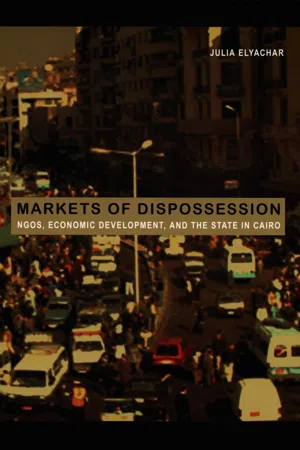
Markets of Dispossession
NGOs, Economic Development, and the State in Cairo
- English
- PDF
- Available on iOS & Android
Markets of Dispossession
NGOs, Economic Development, and the State in Cairo
About this book
Julia Elyachar studied the efforts of bankers, social scientists, ngo members, development workers, and state officials to turn the craftsmen and unemployed youth of Cairo into the vanguard of a new market society based on microenterprise. She considers these efforts in relation to the alternative notions of economic success held by craftsmen in Cairo, in which short-term financial profit is not always highly valued. Through her careful ethnography of workshop life, Elyachar explains how the traditional market practices of craftsmen are among the most vibrant modes of market life in Egypt. Long condemned as backward, these existing market practices have been seized on by social scientists and development institutions as the raw materials for experiments in "free market" expansion. Elyachar argues that the new economic value accorded to the cultural resources and social networks of the poor has fueled a broader process leading to their economic, social, and cultural dispossession.
Frequently asked questions
- Essential is ideal for learners and professionals who enjoy exploring a wide range of subjects. Access the Essential Library with 800,000+ trusted titles and best-sellers across business, personal growth, and the humanities. Includes unlimited reading time and Standard Read Aloud voice.
- Complete: Perfect for advanced learners and researchers needing full, unrestricted access. Unlock 1.4M+ books across hundreds of subjects, including academic and specialized titles. The Complete Plan also includes advanced features like Premium Read Aloud and Research Assistant.
Please note we cannot support devices running on iOS 13 and Android 7 or earlier. Learn more about using the app.
Information
Table of contents
- Contents
- Acknowledgments
- A Note on Transliteration
- 1. Introduction: The Power of Invisible Hands
- 2. A Home for Markets: Two Neighborhoods in Plan and Practice, 1905-1996
- 3. Mappings of Power: Informal Economy and Hybrid States
- 4. Mastery, Power, and Model Workshop Markets
- 5. Value, the Evil Eye, and Economic Subjectivities
- 6. NGOs, Business, and Social Capital
- 7. Empowering Debt
- Conclusion: The Free Market and the Invisible Spectator
- Notes
- Bibliography
- Index